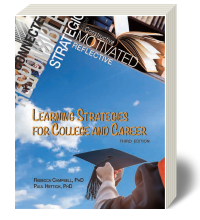Learning Strategies for College and Career
Third Edition Hettich, Campbell, © 2018, 450 pages
Learning Strategies for College and Career focuses on a student success model built on a foundation of research and effective practices in the literature of educational psychology, psychology, student affairs, and higher education. The model is used as a framework for the entire book, but the text itself is arranged around traditional clusters of ideas, issues, learning strategies, and processes that are known to facilitate student success.
Request Examination Copy Test Drive LAB BookPopular Formats (with student pricing)
For 10% off LAB BOOK price, use coupon code LB10 at the checkout at www.BVTLabBook.com.
LAB BOOKPlus ($26 to student)
This format includes our LAB BOOK Platform, providing a web-based eBook with fully integrated lab and study resources.
- Built-in comprehension questions
- Notes and highlighting
- Interactive and multi-media components
- Integrated Lab providing:
- Student study resources
- Homework assignments (auto-graded)
Traditional Print
Our traditional print version of this textbook is available in the following formats:
- Loose-leaf textbook ($61)
- TEXTBOOKplus [Loose Leaf / online eBook / downloadable eBook / Lab] ($71)
- Soft cover, perfect bound ($217)
See Prices and ISBNs for bookstore pricing.
Prices and ISBNs
This title is available in the following formats.
|
Product
Description ISBN |
Description | ISBN | Bookstore (Net Price) |
Student (Retail Price) |
|
LAB BOOKPlus
Online eBook + Lab978-1-5178-0385-8 |
Online eBook + Lab | 978-1-5178-0385-8 (9781517803858) | $22 | $29 |
|
Loose Leaf
Unbound textbook 978-1-62751-935-9 |
Unbound textbook | 978-1-62751-935-9 (9781627519359) | $43 | $61 |
|
TEXTBOOKPlus
Loose Leaf + eBook + Lab 978-1-62751-938-0 |
Loose Leaf + eBook + Lab | 978-1-62751-938-0 (9781627519380) | $50 | $71 |
|
Soft Cover
Bound textbook 978-1-62751-936-6 |
Bound textbook | 978-1-62751-936-6 (9781627519366) | $153 | $217 |
Supplements
The available Supplements are listed below:
Click here to access ancillaries save_altInstant Access (and Coupons)
All students can have free Instant Access to an eBook for the first two weeks of class while they procure their textbook. They will also receive a 10%-off coupon valid at the BVT web store for the best possible price. Get instant access codes here.
Instructor's Manual
The Instructor's Manual consists of chapter summaries, learning objectives, chapter and lecture outlines, lecture suggestions and classroom activities to better assist you with your teaching curriculum.Lecture Slides
This PowerPoint™ slide set combines figures, tables and text to further illustrate the principles discussed in the text.Test Bank (Blackboard)
The Blackboard Test Bank contains questions in a variety of formats including multiple choice, true/false, short answer, and essay questions. This file is an archive of per-chapter zipped Blackboard pool files.Test Bank (Canvas QTI)
The Canvas QTI Test Bank contains questions in a variety of formats including multiple choice, true/false, and short answer questions. This file is an archive of per-chapter zipped QTI IMS files.Exam Bank (Word)
The Exam Bank contains questions in a variety of formats including multiple choice, true/false, short answer, and essay questions.Quiz Bank (Blackboard)
The Blackboard Quiz Bank contains questions in a variety of formats including multiple choice, true/false, short answer, and essay questions. This file is an archive of per-chapter zipped Blackboard pool filesQuiz Bank (Canvas QTI)
The Canvas QTI Quiz Bank contains questions in a variety of formats including multiple choice, true/false, short answer, and essay questions. This file is an archive of per-chapter zipped QTI pool files.Quiz Bank (Word)
The Quiz Bank contains questions in a variety of formats including multiple choice, true/false, and short answer questions.Homework Bank (Blackboard)
The Blackboard Homework Bank contains questions in a variety of formats including multiple choice, true/false, short answer, and essay questions. This file is an archive of per-chapter zipped Blackboard pool files.Homework Bank (Canvas QTI)
The Canvas QTI Bank contains questions in a variety of formats including multiple choice, true/false, short answer, and essay questions. This file is an archive of per-chapter zipped QTI pool files.Homework Bank (Word)
The Homework Bank contains questions in a variety of formats including multiple choice, true/false, and short answer questions.Excerpts
Description
We are also proud of several other changes to the third edition of Learning Strategies for College and Career. In particular:
- Help-seeking, as an important behavior for college success was included in Chapter 4: Help-Seeking Behavior and Campus Resources. By valuing opportunities to get expert assistance, students are positioned to respond to situations which might negatively impact their long-term goals.
- The concept of using feedback, both personal and academic, was included in the chapter on assessment. By using feedback to gauge success, students can become more quickly resilient and responsive in the face of negative course feedback or more reflective and motivated in the face of positive course feedback.
- This edition includes broader coverage of the context of learning in general. We have included foundational information about academic policies, courses, and instructional modes, as well as addressed learning strategies, memory theory, metacognition, and how to study.
- This edition also includes broader coverage of the notion of self-regulation or self-management. Rather than limiting the self-regulation and management to traditional academic issues such as time and studying, we have made connections with a larger set of issues that students need to manage. These include wellness issues such as money, health, sleep, and nutrition, as well as personal issues such as emotions, stress, communication and listening.

